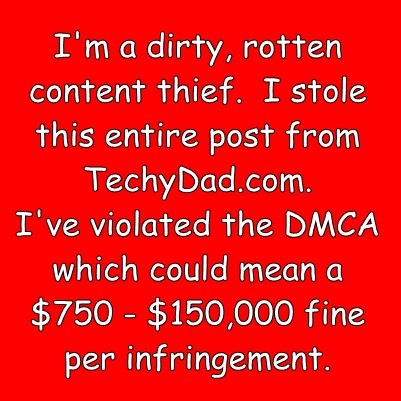Content Thieves and Malicious DMCA Takedowns
 Pretty much anyone who has put content online has encountered it. Someone takes your content and puts it on their own website. They might be generating ad revenue from your content or they might just be trying to gather good content (as opposed to generating good content) to that their site looks good.
Pretty much anyone who has put content online has encountered it. Someone takes your content and puts it on their own website. They might be generating ad revenue from your content or they might just be trying to gather good content (as opposed to generating good content) to that their site looks good.
Whatever their reasons, their theft of your content has serious repercussions. Beyond simple copyright theft, search engines can knock sites down if it sees the same content on multiple websites. If a content thief takes your content, it could mean that you actually get dinged in the search engine rankings.
Thankfully, content owners have a recourse via the Digital Millennium Copyright Act (DMCA). The DMCA says that copyright owners who find their content online without permission can send a letter (DMCA takedown notice) to the person or company hosting the material. The person/company then must take down the material. Once they do, the person who put the content online can then either accept that the material was taken down or contest this takedown.
Once they contest it, it is a matter between the poster and the copyright owner. The hosting company is off the hook and isn’t involved. This is a good thing. Were this not the case, the mere act of letting users put any content online would be too much of a lawsuit risk. The Internet as a whole would grind to a halt.
Sadly, however, DMCA requests can be abused. Recently, Retraction Watch, a blog run by Ivan Oransky and hosted on WordPress.com, found many of their postings gone. After doing some investigating, it turned out that one of the subjects of his postings, a cancer researcher who was being investigated for fraud in his research and inaccuracies on his resume wanted to improve his online reputation.
To improve his online reputation, the cancer researcher hired a company. The company copies Retraction Watch’s content. Then, they filed DMCA takedown notices with WordPress, claiming the content was their own. WordPress complied and the content was deleted. Now, Retraction Watch is trying to recover their lost content.
This is, understandably, very worrying. Theoretically, false DMCA takedown requests constitute perjury. Practically, though, there is no penalty for filing a false request. How many more people will find their content gone via DMCA takedown because some person or company doesn’t like what they posted? How many content thieves will steal content and then try to take the originals down to bolster their claim over the stolen content?
How can you protect yourself? The best way is to always back everything up locally. This way, even if you are struck with a malicious DMCA takedown notice, you won’t actually lose any content. If you are running a self-hosted WordPress blog, there are many plugins that you can use to back up your database. (I prefer WordPress Database Backup.) If you are on WordPress.com or Blogger.com, this site has some recommendations.
Even if you think you can trust your host, it is a good idea to back up. You never know when a malicious DMCA request will come your way and it is the best method of protecting yourself.
NOTE: The burglar image above is by tzunghaor and is available from OpenClipArt.org.



